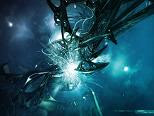There was Dee Roberts (Nicole Beharie), a twenty-four-year old waitress whose main goal in life is to collect enough tips by pouring coffee and serving compliments to old women on their neglected change in hair style to provide for her four young daughters. The film jumpstarts by juggling between Dee’s apartment in the projects (where the greatest transgression is a bowl of unfinished cereal and a busted bottle of peanut butter) to the parking lot of police headquarters where a hundred cops are assembling an arsenal composed of everything but the army tank to launch a raid on the unsuspecting tenants of an African-American complex.
From the start, the good vs. evil motif takes off with a whir. Choppers descend like beasts on the unarmed peasants of Melody and our heroine is tossed in a dungeon (in this case the county jail) on charges of distributing narcotics in a school zone.
But wait, not only is she innocent, but so are the one hundred or so other prisoners, most of whom are forced to accept plea bargains or face trial where the prison uniforms are pre-maid for the expected outcome. Dee isn’t accepting any plea bargains, however, despite encouragement by her mother, Alma (Alfre Woodard), and her defense attorney (Paul David Story), who’d rather see the case settled so he can get back to sipping Manhattans on the other side of the train tracks.
So, what’s a woman to do when the going gets rough?
Sue the district attorney, Calvin Beckett. Michael O’Keefe, in the role of Beckett, is the supreme bad guy, cool as a cucumber with an arrogance the size of Canada that you want to see squeezed to a slimy, obliterated pulp.
And who’s to man the harvest? It’s the Civil War in miniature as North and South come together in a farrago of Texas twang and University lingo, only this time they're fighting on the same side in the form of Tim Blake Nelson and Will Patton as David Cohen, a clean-shaven, court-house ACLU attorney, and Sam Conroy, the gun-toting, ex-narcotics officer turned lawyer who you know is sporting a bowie knife right next to his .44 Magnum.
They are the dynamic duo, the improbable pair with Byron Hill (Malcom Barrett) as their ace in the hole. The African-American attorney comes through like Vergil Tibbs with a figurative slap against the pale, not-so-untouchable cheek of iniquity.
With comic relief like deer in a desert, the film is washed in wave after wave of unremitting gravity in the style of a courthouse drama minus the courthouse where a bunch of guys, in this case big shot lawyers in suspenders, come together like Henry Fonda, Lee J. Cob, and the rest of the cast of Twelve Angry Men. A sprinkling here and there of dramatic dialogue and camera close-ups intensifies the stark pressure of the film. It's in one of these that Anthony Mackie, as paranoid schizophrenic Eddie Porter (whose been bullied into turning confidential informant on his friends and neighbors), reveals just how much seriousness plays a role in this straight-forward procession of fountain pens and legal pads. "I understand the seriousness of this whole situation . . . I understand the seriousness of not being able to sleep good at night 'cause you worried about somebody coming to your house and harming you or your family members. I understand a lot. And I know my life will never be the same."
Neither will Dee’s when she’s pounding the pavement in Beckettville looking for that lone employer who hasn’t been threatened into turning her down. In the scenes when she’s sparring with ex-lover Darrell (Xzibit) over the custody of her children or scraping by with just enough for a Christmas tree, you expect to hear Ray LaMontagne crooning in the background. Nicole Beharie is cozy in the role of Dee, the dark avenger without the Batman get-up and O-so-mighty superman complex. She’s the hammer forging the way for director Tim Disney (grandnephew of Walt) into the real and pensive world outside of happily ever after.
That’s where Regina Kelly, a 24-year-old waitress and mother of four, sued district attorney John Paschell of Hearne, Texas for issuing a “paramilitary” drug sweep that led to the arrest of 27 individuals on felony distribution charges. From the riveting true story, American Violet is no blossom with its dark presentation of racial profiling and arduous drama, but the plot itself is enough to grow on you, making for a worthwhile and cultivating view.

